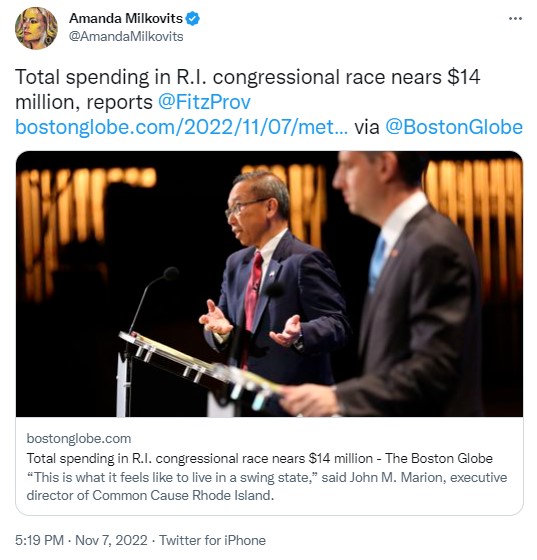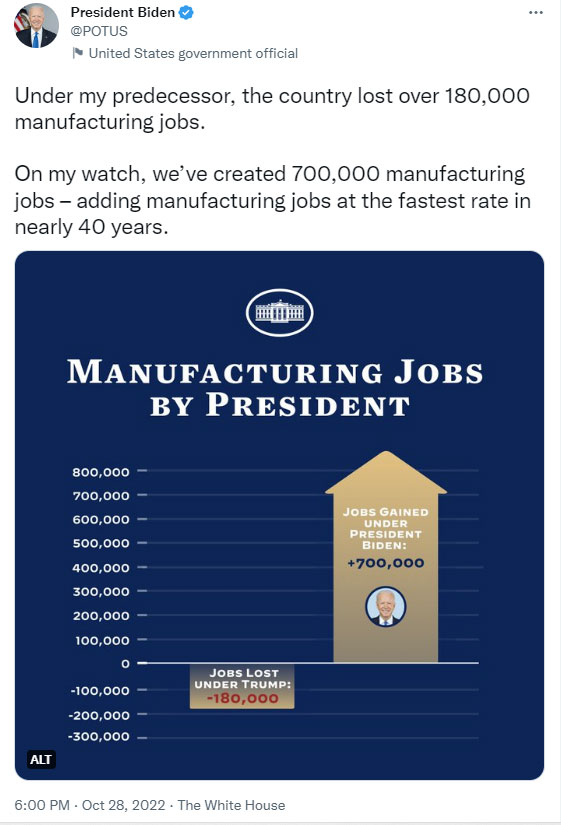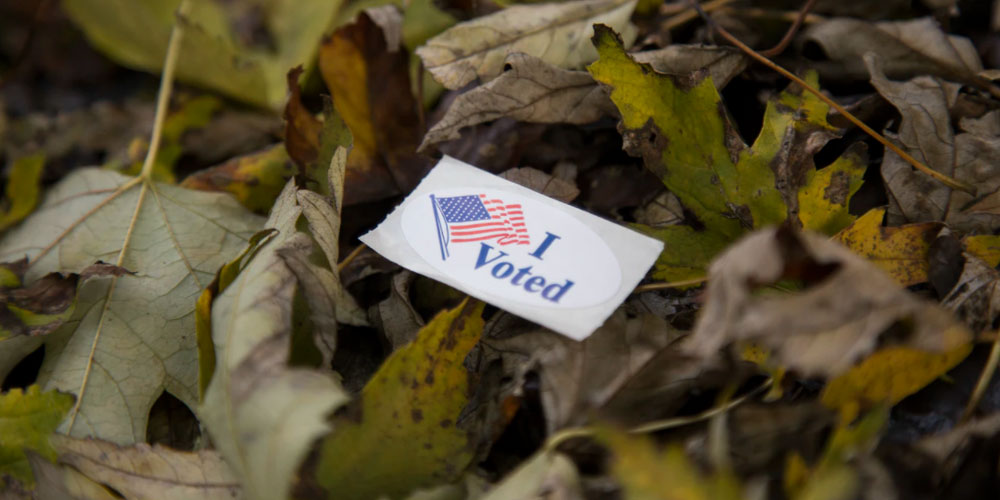First a note to those who might be newly engaged in politics or have forgotten: It isn’t at all unusually for the media narrative to switch after the votes are in. Thus, whereas before, commentators would say that it might be such a big “red wave” that the Republicans would take the Senate, indicating that there could be a wave even if that did not happen, afterwards, that switches to insisting that there was no wave at all because the Republicans didn’t win the Senate by several seats (or, at this point, might not win it at all).
That said, declarations that the red wave did not emerge, compared with other midterm elections are tending to ignore that this is the first midterm in the new world of post-COVID mail balloting. In economic terms, mail balloting moved the supply of ballots down and to the right, meaning that more could be had for a lower price, and given their constituencies and organizational structure, Democrats benefit more from that.
That’s part of the current political reality, and Republicans have to solve the puzzle.
[Open full post]Triumphal Democrats on social media provide a lesson it’s important for Rhode Island conservatives and Republicans to remember: Being on the winning side feels good. Being a sure bet is a powerful asset. Success builds on success, as they say. Winning elections is validation, even if the race is skewed. Any strategy for change must address this human default.
A thirty-something-year-old bit from comedian Louis Anderson comes to mind. Asking why poor people in the inner city might become drug dealers, he acted out the decision between dealing and working for minimum wage at a fast-food restaurant. The analysis applies well to the question of why Rhode Islanders might emotionally invest in the Democrat Party.
Most of the outcomes, today, were beyond the margin of fraud (except to the extent that legal ballot harvesting is implicitly fraudulent). These results are the lay of Rhode Island’s political landscape. Please note that this is a statement about politics not beliefs, which might be different.
Let me segway, for a moment, to Republicans’ relative performance; the first question has to be, “Compared with what?” I’m not in a position to run the numbers, just now, but having watched Rhode Island elections closely for a couple decades, I’d suggest that the GOP candidates did well compared with the standard. High-30s to mid-40s represents an increase from baseline. It’s not enough, and it’s not a good sign for the party or the state that this is the high-water mark, but don’t believe any spin that makes too much of the fact that Democrats won. Rather, it would have been a major upset if they didn’t. (We got our hopes up with Fung, but mostly we discovered that the Democrat machine had more umph in reserve it could deploy.)
So, what then? Honestly, a big part of Rhode Island’s problem, which is felt most acutely by Republicans but is, don’t you doubt, a very real worry for the state as a whole, is that it is simply easier to get out of here than to try to arrest the downward spiral. If you’re young and only want to build a life for yourself, the obvious move is to move. Without the federal government pouring money into the state, relying on its own politically inbred leadership, the state will be in major trouble. Fly! Go!
But if your ties here are too deep (and let’s not forget that living in one of the lowest-opportunity states in America is still winning the lottery, historically speaking), or if you share my missionary bent, turn your attention to answering the question of what can actually change direction.
On that question, I’ll make two observations. First, we cannot rely on good candidates to fly in and save us. Consider Fung, Guckian, and Lathrop. Not only were they all supremely qualified, but they’ve been engaged in the state in their own ways for years. Even if there is no line to get to the front of the GOP pack, there is value going through the motions of delay. Second, the pugilistic approach of some, with whom I’ve worked closely, is doomed to fail. It doesn’t recognize where we actually are.
To these ends, I’m doing my best, while trying to earn a living on the side, to return to an approach I think will make a difference, with my Rhode Island Saga series. I hope the candidates who ran this time around will join me in stepping back and reevaluating, rather than throwing up their hands and walking away.
Featured image from Shutterstock.
[Open full post]The National Popular Vote Interstate Compact, which Rhode Island has ill-advisedly joined, requires that, whenever enough states have joined to control the Electoral College outcome for the President of the United States, all participating states must give their Electoral College votes to whichever candidate won the most individual votes nationally, no matter what their own citizens wanted. You don’t have to be a political analyst to suspect that Ocean State Democrats assume their party’s current advantage in Rhode Island and urban areas nationally will be eternal so that the national popular vote will only ever differ from the Electoral College in their favor.
Of course, they’d never make the argument in those terms, so they did things like insist the national popular vote would make Rhode Island more relevant to politicians, leading them actually to campaign here. In reality, the Electoral College basically doubles Rhode Island’s importance in presidential elections, so the compact would actually cut our relevance in half.
What makes us irrelevant to national politics is that we’re small, yes, but also that we’re the owned property of a particular party. The solution would be to reform the many systemic factors that give insider Democrats insurmountable advantages. For evidence, consider this tweet and article from Amanda Milkovitz of the Boston Globe:

Politics is like the economy in this regard. When people have competitive options, things go better. It therefore behooves us to err in favor of competition in the structure of our laws and civic culture. But as with businesspeople, politicians don’t like uncertainty and risk, so when they can, they’ll tilt things in their favor.
Featured image by Josh Carter on Unsplash.
[Open full post]… no matter how much you lose (or is taken from you) … you will always be able to find moments like this, because they are your relationship with God, and that relationship is eternal.

News out of Georgia adds to the impression that no society that treated the right to vote as sacred would allow no-reason early and mail-in voting:
[Open full post]A Cobb County judge extended the deadline for 1,036 absentee ballots because Cobb Elections officials did not send them out to the recipients.
The ballots have to be postmarked by Election Day, which is tomorrow.
Am I crazy to think it’s just too coincidental that one of the key battleground states for control of Congress is having this sort of unbelievable electoral complication?
Some of Pennsylvania’s largest counties were among those working Monday to help voters fix mail-in ballots that have fatal flaws such as incorrect dates or missing signatures on the envelopes used to send them in. …
Elections officials in Philadelphia and Allegheny, which includes Pittsburgh, announced measures they were taking in response to state Supreme Court orders in recent days that said mail-in ballots may not be counted if they lack accurate handwritten dates on the exterior envelopes.
No-reason early and mail voting are invitations to fraud and corruption and will be the end of democracy in America.
[Open full post]On WNRI 1380 AM/95.1 FM, John DePetro and Justin Katz discuss:
- Candidates for governor debate, fight, and deal with curve balls
- McKee versus media (who are still on his side)
- CD1 contrasts
- State of other campaigns
Featured image by Justin Katz.
[Open full post]John Loughlin interviews Ed Cabral on WaterFire’s Salute to Veterans and Michelle Cruz on Trinity Rep’s community engagement.
Featured image by Peter John Maridable on Unsplash.
[Open full post]Here’s a noteworthy WPRI headline: “‘Speechless:’ 7-year-old child brings gun to Boston school.” Must be all those Republicans who control the city!
Out of curiosity, I went in search of information about how strict Massachusetts’s gun-control laws are and found myself reminded of that old Weezer song about unraveling a sweater: “If you want to destroy my sweater, hold this thread as I walk away… watch me unravel; I’ll soon be naked.” As with many “social issues,” the information surrounding gun control provides a case study in information manipulation.
This is Boston, we’re talking about, in Massachusetts, which the left-wing/Democrat advocacy group Everytown ranks as number 4 for the strength of its gun-control laws: a “national leader”! If the gun laws in Massachusetts have results that leave you “speechless,” then you simply want to ban guns altogether.
Everytown’s chart comparing “Gun Law Strength” with “Gun Violence Rate” would be an excellent lesson in the use of data for propaganda, if educational institutions were still capable of teaching such subjects objectively.
The Gun Law Strength appears to be based on a 100-point scale, presumably reflecting Everytown’s policy preferences. On the chart, this measure is matched up — as if they are of equal scale — with the Gun Violence Rate, which is calculated much differently. Judging from the chart, that side of things is based on a 30-point scale, specifically the number of gun deaths per 100,000 residents.
So, the Gun Law Strength measure is a percentage of the perfect policy portfolio, in this left-wing group’s view, but for the Gun Violence Rate, they simply pick a round number that’s a little bit worse than the worst state in the country. If we were to convert the Gun Violence Rate to percentages of the population, the chart would show no discernible difference at all. One gun death out of 100,000 people would be 0.001%, whereas 30 gun deaths would be 0.03%. You can’t see such differences on a fully scaled chart. Alternately, Everytown could have made a case for some number of gun deaths that would be experienced somewhere with absolutely zero restrictions, which (however high that might be) would have also decreased the differences in the chart.
This is a classic example of what should have been taught to every high school graduate at some point in his or her education. Watch the scales. If somebody is zooming in to super-fine detail, it may be because they’re trying to make miniscule differences seem significant.
In this light, the observer might notice something else about the chart. Sorting by either measure makes that sorting measure into a smooth curve, but the other side is not smooth. For gun-control, 12th place Rhode Island has 5.1 gun deaths per 100,000 residents, while 42nd place New Hampshire has 8.9, which isn’t a tremendous difference. Somehow, 16th place New Mexico, which Everytown labels as “making progress” is the 7th worst for gun deaths, with 22.6 per 100,000.
One might reasonably speculate that the difference between states depends more strongly upon something other than gun control. Population, for instance, density appears to play an important role if you compare the states at the top with the states at the bottom. If gun deaths tend to increase at less than the rate of population growth, then the seeming correlation with gun control may be entirely coincidental.
Look at Everyday’s “National Failures.” Somehow states like Idaho, Montana, and Wyoming aren’t known for being particularly dangerous, but based on the chart, you’d think people would avoid them more carefully than an inner-city gangland.
Featured image by Thomas Eakins on WikiArt.
[Open full post]Many in Rhode Island are too steeped in the mainstream narrative to even consider such a thing, but Joe Biden is, in his way, nastier, more divisive, and more destructive of our civic norms than what Democrats claim of President Trump. In fairness to Biden, however, his is just an exaggerated and less competently executed instance of progressives’ ordinary approach to politics.
I have in mind this tweet, which is easy to gloss over as the sort of political baloney that everybody who pays attention knows is dishonest. Given the background, it’s much worse than that:

What makes this instance of a politician taking credit for something he didn’t do (indeed, a statistic that would have been even better were it not for his involvement) worse than ordinary isn’t just that he must diminish the sense of shared American success by casting shade at his “predecessor.” The reason everybody knows this statistic to be barely a shade more-true than an outright lie is that the shared calamity of COVID (and our response thereto) is entirely to blame for the downturn from which we’re recovering.
Knowing that low-life hacks like Biden will try to pass off recovery from calamity as their doing, and the calamity the fault of their predecessors, makes it more difficult for public officials to make intelligent decisions. Democrats and the Left led the way in wanting shutdowns. I think that was the wrong move, but the next time it might not be, and the party in power will feel an even greater need to make decisions based on what future politicians might say.
One additional point about something I sensed during the 2020 election: Part of the desperation to place Biden in office that year (amplifying the motivation to cheat) was that the economy’s swinging back was highly predictable. That meant not only that slimes like Biden could take credit for the recovery, but also that progressives could do quite a bit of harm to the economy and hide them under relatively positive numbers.
[Open full post]







